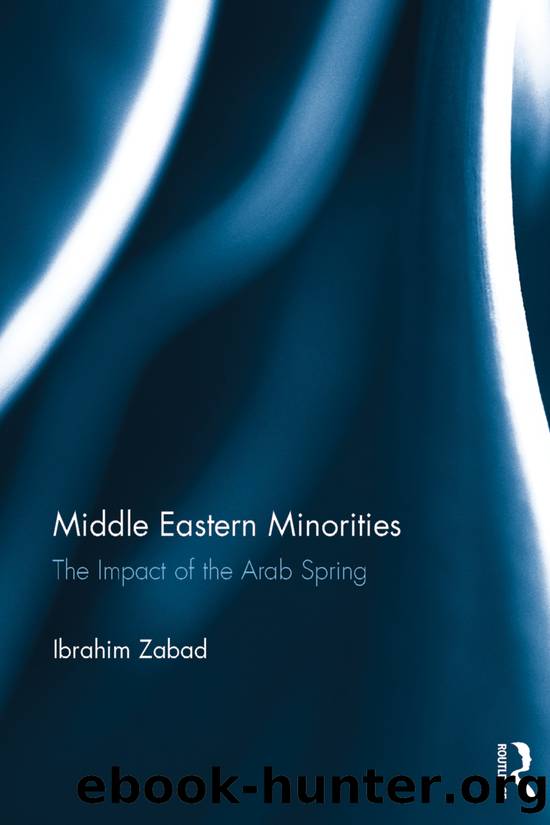Middle Eastern Minorities: The Impact of the Arab Spring by Ibrahim Zabad

Author:Ibrahim Zabad [Zabad, Ibrahim]
Language: eng
Format: epub
ISBN: 9781472474414
Google: 8PFbjwEACAAJ
Goodreads: 30399314
Publisher: Routledge, Taylor & Francis Group
Published: 2017-01-15T11:12:38+00:00
5 The Shiâa in the Arab World
Thanks to a sectarian-industrial complex financed mainly by Saudi Arabia and Qatar and abetted by many other actors in Egypt, Kuwait, United Arab Emirates, Iraq, and Lebanon, sectarian animosities have reached unprecedented levels in the Arab World. As columnist Patrick Cockburn wrote in The Independent, âsimply to be identified as Shia or a related sect, such as the Alawites, in Sunni rebel-held parts of Iraq and Syria today, has become as dangerous as being a Jew was in Nazi-controlled parts of Europe in 1940.â1 Although not all Arab states are involved in this wholesale campaign of dehumanizing and demonizing all the Shiâa, most are complicit through their silence or nod of approval. Notably, not a single Arab state has raised its voice to denounce anti-Shiite bigotry, either within their borders or abroad. Three major developments characterize sectarian dynamics consuming the region now: First, anti-Shiite rhetoric, seething with hatred and brimming with revenge, has become normalized in mainstream discourse. Second, and perhaps more importantly, Shiâism itself as a faith has become suspicious, not just the political activities of some Shiite faithful. Third, violence against the Shiâa, just like rhetoric, has become normalized.
Admittedly, anti-Shiite bigotry is mostly manufactured and propagated by targeted campaigns, state policies, and Wahhabi-influenced clerics. However, a large segment of the public in the Arab world has shown high receptivity to sectarian incitement. Indeed, according to a Pew Forum survey, a large number of Sunni Muslims (53% of Egyptians, 43% of Jordanians, 40% of Palestinians, 50% of Moroccans, and 41% of Tunisians) do not even recognize the Shiâa as fellow Muslims. Only in Iraq (82%) and Lebanon (77%) do a majority of Sunnis consider the Shiâa legitimate members of the faith.2 We have to treat those numbers with extreme care, however. Whether one believes the Shiâa are Muslims or not is a sensitive question that might have made many interviewees uncomfortable and reluctant to speak their minds. It is quite likely that the number of Sunnis who think the Shiâa are apostates is significantly larger than what the survey reported.
The Arab Spring, especially the civil wars in Syria, Yemen, and Iraq, and the uprising in Bahrain, did not cause the sectarian ordeal gripping the Arab world; it only brought the deep-seated problems into sharp focus. The image of the Shiâa as a transnational threat to the stability of the Sunni-majority Arab world is a largely recent phenomenon, stemming from the aftermath of the Iranian Revolution. In the last two decades, though, powerful Sunni leaders have used strong sectarian language, ultimately creating a Shiite âscare.â King Abdullah of Jordan claimed in an interview with the Washington Post in 2004 that there was an imminent threat of a âShiite crescent,â extending from Iran through Iraq, Syria, and Lebanon, that would upset the strategic and sectarian balance in the region.3 Egyptian President Hosni Mubarak echoed King Abdullahâs remarks when he claimed âMost of the Shias are loyal to Iran, and not to the countries they are living in.
Download
This site does not store any files on its server. We only index and link to content provided by other sites. Please contact the content providers to delete copyright contents if any and email us, we'll remove relevant links or contents immediately.
Getting It, Then Getting Along by L. Reynolds Andiric(650)
Religion and Politics Beyond the Culture Wars : New Directions in a Divided America by Darren Dochuk(556)
Global Justice, Christology and Christian Ethics by Lisa Sowle Cahill(428)
Positive Psychology in Christian Perspective: Foundations, Concepts, and Applications by Charles Hackney(352)
Forgiveness and Christian Ethics by Unknown(342)
Douglas Hamp The First Six Days by Unknown(291)
The Horrors and Absurdities of Religion by Arthur Schopenhauer(268)
Insurgency, Counter-insurgency and Policing in Centre-West Mexico, 1926-1929 by Mark Lawrence(253)
Middle Eastern Minorities: The Impact of the Arab Spring by Ibrahim Zabad(244)
Christian Martyrdom and Christian Violence by Matthew D. Lundberg;(240)
Beyond Heaven and Earth by Gabriel Levy(231)
God and Eros by Patterson Colin;Sweeney Conor;(229)
The Oxford Handbook of Greek and Roman Mythography by R. Scott Smith;Stephen M. Trzaskoma;(228)
The Bloomsbury Reader in Christian-Muslim Relations, 600-1500 by David Thomas;(223)
Autobiography, Volume 2: 1937-1960, Exile's Odyssey by Mircea Eliade(214)
Witches: the history of a persecution by Nigel Cawthorne(210)
Cult Trip by Anke Richter(208)
An Introduction to Kierkegaard by Peter Vardy(197)
The Myth of Disenchantment by Jason A. Josephson-Storm(187)
